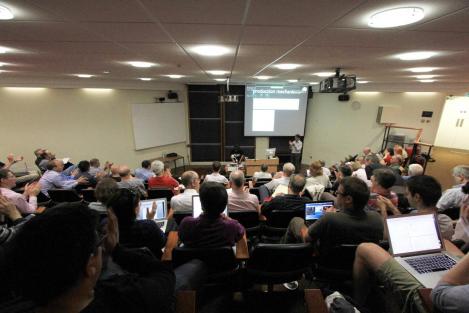In September 70 members of the UK particle physics community met in Oxford and participated in an informal meeting of the Linear Collider – UK (LCUK) group. The meeting, which attracted several distinguished international speakers, was focussed on reviewing the status of the International Linear Collider (ILC) project that has been proposed by the Japanese high-energy physics community to be built in Japan, and on exploring opportunities for UK involvement.

The ILC is a proposed 20-30km long electron-positron collider whose design has been developed over the past decade by an international team of several hundred accelerator physicists and engineers. Several members of the John Adams Institute for Accelerator Science have played key roles in leading the design of this gargantuan accelerator facility. A core purpose of the ILC would be to serve as a Higgs boson ‘factory’, producing tens of thousands of Higgses per year in a very clean experimental environment, thereby allowing precision measurements of the particle’s properties in a complementary fashion to ongoing studies at the LHC.
In the past 18 months developments have proceeded apace. Following the announcement of the discovery of the Higgs boson at the Large Hadron Collider (LHC) at CERN in 2012, the Japanese community announced its intention to bid to host the ILC in Japan. The ILC Technical Design Report was officially completed and presented to the International Committee on Future Accelerators (ICFA) in June 2013, and in September 2013 a recommendation for the ILC site (Kitakami, Iwate prefecture) was made. The project has a high political profile in Japan, with broad cross-party and industrial support, and over the coming months the Japanese Government is expected to initiate discussions on implementing the project with potential international partners.
The timely Oxford meeting, organised by Phil Burrows (JAI) and Mark Thomson (Cambridge), reviewed the ILC physics programme, as well as the accelerator and detector designs. The conclusion is that there are many opportunities for the UK to be (further) involved in realising both the accelerator and the detectors, and the group agreed to work on honing our strategy for advancing the project in the UK. Follow-on meetings are planned for November 2013.
Photo caption: UK community members discussing the International Linear Collider at the September LCUK meeting at the John Adams Institute, Oxford University, September 2013.